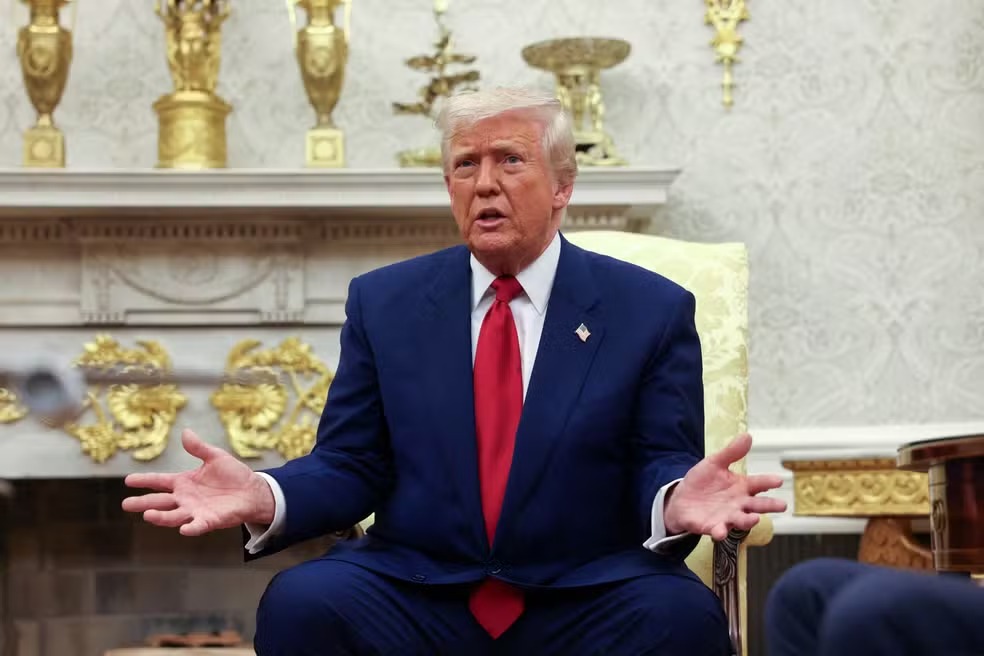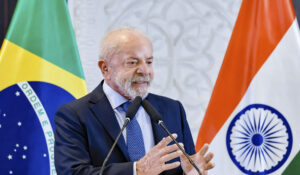
Published 10/04/2025 14:48 | Edited 10/04/2025 15:27
United States President Donald Trump’s decision to suspend for 90 days the application of “reciprocal” tariffs against most countries – except for China – caused a strong rally on international scholarships and opened a new front of political wear to the White House.
The measure was announced on Wednesday (9), a few hours after Trump published on his social network that this was “a great time to buy”. The comment, made before the official opening of the US market, coincided with one of the largest daily valuations recorded since the 2008 crisis.
The Nasdaq, technology -focused index rose 12%, while S&P 500 advanced 9.5%and Dow Jones won 8%, about 2,800 points. The recovery eliminated about 70% of the losses accumulated in the previous four trading sessions, according to analysts. In other words, the presidential forecast was immediately confirmed by market movements – and that is precisely what has raised suspicions of manipulation.
More than the broad rates, the performance of companies directly linked to Trump drew attention. Trump Media and Technology Group actions – Truth Social controller, a network used for the message – closed the day up 22.67%. The post was signed with the initials “DJT”, which coincide with the company’s code on the Scholarship. The appreciation generated a patrimonial gain of about $ 415 million to the investment fund that owns the participation of Trump, today on behalf of his eldest son.
The Democratic opposition reacted quickly. Senators like Adam Schiff, Chris Murphy and Richard Blumenthal have asked for an immediate investigation from Congress and regulatory bodies. “These constant politics fluctuations create dangerous opportunities for privileged information use,” Schiff wrote. Deputy Alexandria Ocasio-Cortez charged that members of the congress disclose any purchase of shares made in the previous 48 hours. “I have heard interesting conversations in the corridors,” he said.
Ambiguity in the statements and silence of the White House feed doubts
In an interview after the announcement of the suspension of tariffs, Trump was questioned by journalists about when he would have made the decision. The answer was vague: “I would say it was this morning. In recent days, I have been thinking about it,” he said. Then he stressed that the idea came up early today. The lack of precision, coupled with the direct impact of the post on the market, has expanded the perception that the president may have acted with political and financial goals.
The White House did not comment on the specific content of Trump’s message or direct mention to the “DJT” ticker. In a generic note, he stated that the post was intended to “reassure the markets” and accused the democrats of “trying to score political points.” The Secretary of Commerce, Howard Lutnick, claimed that Trump only expressed his confidence in the country: “He understands that the US is the largest country in the world and have enormous ability to prosper.”
Public ethics experts did not see the same way. Richard Painter, a former White House ethics, the George W. Bush government, said the situation raises serious doubts. “This type of post can expose the president to accusations of market manipulation. He should focus on ensuring a predictable trade policy and letting the market work for himself,” he said. Painter also recalled that this is not the first time Trump has been accused of operating in gray business and politics, as in the case of cryptocurrency launched by former president’s allies.
The Justice Department refused to comment on the case. The US Securities Commission (SEC) also did not comment until the closure of this report. Sources heard by New York Times They claim that Congress can be pressured to open a formal investigation if evidence arises that Trump’s allies operated on the market based on early information.
Tariffs continue on China, and tension with Beijing can grow
Despite the partial retreat, the president kept the rock climb. The rate on Chinese products, which had risen to 104% on Tuesday, was raised to 125% again. The decision isolates China as an exclusive target of the new tariff round and can deepen the confrontation between the two largest economies in the world.
Beijing, who had already announced 84% rates on US goods, has not formally responded to the new climb. Sources linked to the China Ministry of Commerce told Xinhua agency that the government will “carefully evaluate the appropriate response” without discarding new retaliation. Sectors such as agriculture, semiconductors and services are expected to enter the next list of targets.
Internally, analysts estimate that Trump has tried to avoid total investor confidence collapse by preserving strategic allies in the new round of commercial sanctions. The White House also studies negotiation proposals with the European Union, which has already announced reprisals against US products and signaled that it can trigger the World Trade Organization mechanisms.
Next steps: pressure for investigations and possible legal unfolding
Even without formal evidence so far, the episode broadens the White House’s institutional wear and feeds the perception that private interests are still mixed with the conduct of US economic policy. The reaction of markets and the appreciation of Trump Media actions place more wood in the fire of a government already pressured by allegations of favoritism and conflicts of interest.
The opposition must insist on the opening of a parliamentary investigation, and it is expected that regulatory bodies such as SEC be officially triggered. Depending on the evolution of the coming weeks, the case can become a new point of inflection in the presidential campaign – and put trade policy at the center of the 2025 electoral debate.
Source: vermelho.org.br

